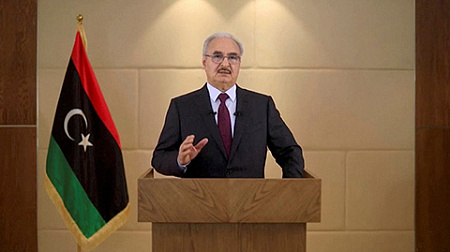
Greece fears that Eastern Libya, relying on the military commander Khalifa Haftar, will conclude an agreement on maritime borders with Turkey. Ankara concluded a similar deal with a rival, Western Libyan camp in 2019, which then met with opposition not only from Haftar, but also from EU countries. The memorandum actually legitimizes the Turkish vision of what the contours of influence in the Eastern Mediterranean should look like. But Haftar is guided only by his own political interests when negotiating with different centers of power, experts say.
Sources from the Qatari portal The Middle East Eye (MEE) reported that concern reigns in Greece about the course of the Eastern Libyan authorities.
The reason was the decision of the Parliament (House of Representatives) based in the east of the former Jamahiriya to form a technical committee to study the maritime agreement with Turkey, which was concluded back in 2019 by the opposite side of the civil conflict – Western Libya (Tripolitania). Athens considers this an overture to the early ratification of agreements with Eastern Libya, despite the fact that the latter has long opposed such attempts by President Recep Tayyip Erdogan to strengthen his country’s position in the region.
The first to sign a maritime agreement with Ankara six years ago was Tripoli, which is now still in the hands of Haftar’s rival camp, the Government of National Unity (GNA). That text of the document actually ignored the rights of Greece and Cyprus to some exclusive economic zones in the Eastern Mediterranean and consolidated Turkey’s territorial claims. That is why then the agreements that were signed as part of one large package to deepen bilateral cooperation were met with anger not only from Athens and Nicosia, but also from European capitals and Cairo, that is, the countries that had established cooperation with Haftar.
According to MEE, the Greek side has already asked for help from Egypt, one of Haftar’s long-standing military and political partners. Athens wants Cairo to put pressure on the commander of the Libyan National Army (LNA), in whose hands the decision-making mechanism in this part of the African country is actually concentrated, and force him to abandon the deal.
Despite the fact that anti-Turkish rhetoric was initially a powerful propaganda element of Haftar’s policy, the LNA has noticeably softened its approaches in recent years. For example, last fall, the son of the LNA leader Saddam Haftar, who heads the headquarters of the army ground forces, took part in the Turkish defense industry exhibition SAHA EXPO in Istanbul. Such involvement was widely seen as an attempt to diversify channels of military and political support. According to some reports, Saddam Haftar was interested in purchasing advanced products from the Turkish defense industry from Ankara.
Another issue is that the maritime deal effectively makes all of Libya a source of legitimacy for Turkey’s claims. And this could hurt Erdogan’s intention to move closer to the EU, of which Greece and Cyprus are members.
Ankara is still seeking full-fledged membership from the European community, although European capitals are cautious. On May 8, the European Parliament approved a report stating that Turkey’s EU accession process cannot resume under the current conditions. “MEPs are deeply concerned about the continued deterioration of democratic standards in Turkey and the relentless suppression of critical voices. They condemn the harsh actions against recent peaceful mass protests and the persecution of hundreds of protesters through hasty mass trials without any evidence of criminal wrongdoing,” the legislature said in a communique.
In addition, Turkey is now seeking from the European Union to receive a share in the recently formed defense fund (150 billion euros). As Turkish Defense Minister Yasar Guler stated in a recent interview with Reuters, his country intends to “build the security of the future together with the EU” and is ready to work within the European Community with “unbiased and far-sighted allies.”
“There is quite a lot of fog around any deals on Libya and their ratification, not only because of the dual power in the country, but also because of the political upheavals in the Tripoli government,” Anton Mardasov, an expert on the Middle East, told NG. – For example, the official agreement on the use of Turkish military facilities in the west of the country was rejected due to the need for its ratification by the East. At the same time, the legal force of the agreement on the maritime zone was suspended by the Tripoli court after Prime Minister Abdel Hamid Dbeiba came to power. There is quite a lot of bluff and imitation in the political life of Libya, so it is quite difficult to judge the real prospects for the ratification of the agreement on the maritime zone by the East.”
According to the expert, this is an extremely important agreement for Turkey, but Ankara is taking many actions even without official documents, including developing relations with the East and, in particular, with Saddam Haftar. “Despite the practice of previous years, Turkish construction companies are present and operating in the east of the country, and there is a lot of information about upcoming military–related deals,” says Mardasov. “For the East and Haftar’s family, ties with allies and former adversaries are extremely important: it is international support from different capitals that can not only strengthen their power, but also ensure its transit to Saddam, preventing, among other things, a family split.”
